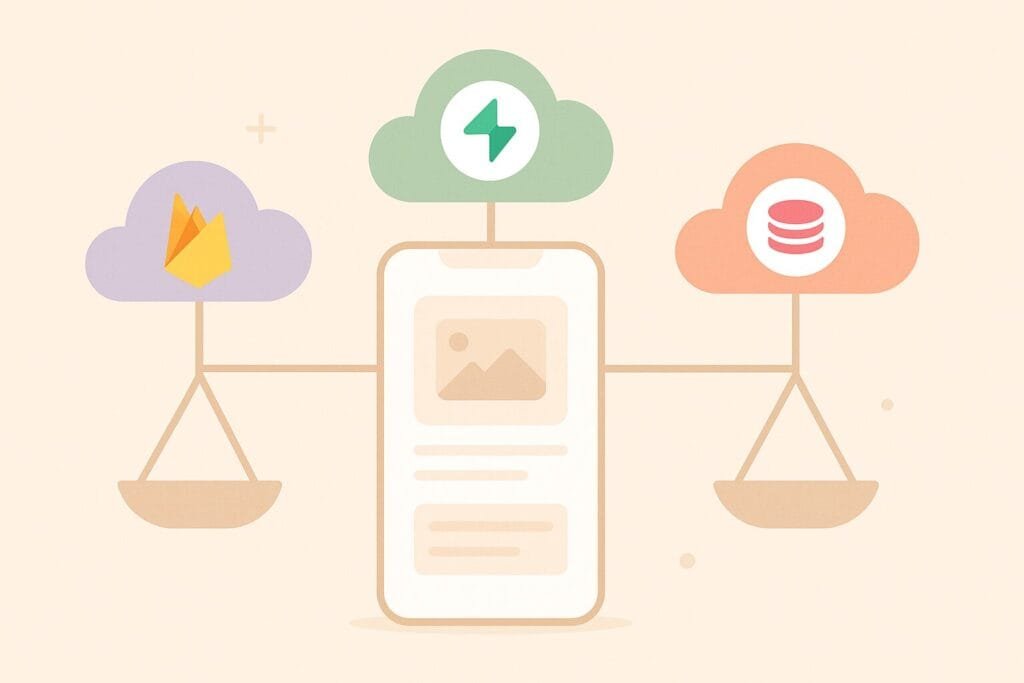Choosing the right Backend-as-a-Service (BaaS) is a game-changer for mobile app developers. With so many platforms available, finding the one that matches your app’s goals — whether you’re building an MVP or scaling globally — can be overwhelming.
In this article, we’ll compare the top BaaS providers in 2025 based on features, pricing, scalability, developer support, and integration capabilities. These platforms offer ready-to-use backend components like authentication, databases, file storage, APIs, cloud functions, analytics, and push notifications — helping you save time, reduce cost, and focus on the front-end user experience.

What is Backend-as-a-Service (BaaS)?
BaaS is a cloud computing service that provides pre-built backend infrastructure to mobile and web app developers. Instead of building a custom backend from scratch, developers can plug into existing backend services and speed up app development dramatically.
Key features of BaaS include:
- User Authentication (OAuth, Social Login)
- Real-time & Cloud Databases
- File Storage
- APIs & SDKs
- Cloud Functions
- Push Notifications
- Analytics & Monitoring
Top BaaS Providers for Mobile Apps in 2025
Here’s a side-by-side comparison of the top BaaS platforms:
| BaaS Provider | Key Features | Pricing Model | Ideal For | Scalability |
|---|---|---|---|---|
| Firebase | Realtime DB, Firestore, Auth, Hosting | Freemium, pay-as-you-go | MVPs, Android/iOS apps | Very High |
| Supabase | PostgreSQL, Auth, Edge Functions | Free & Pro Plans | SQL-based apps, open-source fans | High |
| Backendless | Visual builder, Codeless logic | Free & Paid Tiers | Non-coders, rapid prototyping | Medium |
| Appwrite | Self-hosted, SQL DB, Storage | Open-source | Developers needing full control | Depends on host |
| AWS Amplify | GraphQL, REST APIs, CI/CD integration | Pay-as-you-go | Enterprise & scalable projects | Enterprise-grade |
| NHost | Hasura, GraphQL, PostgreSQL, Auth | Free & Paid | GraphQL-focused apps | High |
In-Depth Comparison
1. Firebase (by Google)
Firebase is arguably the most popular BaaS for mobile apps. It provides an all-in-one platform with excellent documentation, SDKs, and tools tailored for Android and iOS. From real-time database to MLKit, Firebase is great for fast deployment and scalability.
Pros:
- Rich feature set (Realtime DB, Firestore, Crashlytics)
- Google Cloud integration
- Cross-platform SDKs
Cons:
- Pricing can escalate with scale
- Limited flexibility for backend logic
2. Supabase
An open-source Firebase alternative built on PostgreSQL. Supabase offers SQL querying, real-time updates, and edge functions. It’s ideal if you prefer relational databases and open tech.
Pros:
- PostgreSQL-based (structured data)
- Excellent developer experience
- Transparent pricing
Cons:
- Still evolving
- Lacks some advanced features of Firebase
3. Backendless
Perfect for no-code or low-code projects. Backendless offers visual programming tools, push notifications, geolocation services, and API management.
Pros:
- UI-based app builder
- Push notifications
- Codeless logic
Cons:
- Not ideal for high-scale enterprise apps
4. Appwrite
A self-hosted BaaS solution that gives full control over your infrastructure. It includes file storage, databases, functions, and user authentication.
Pros:
- 100% self-hosted (data privacy)
- Built with modern dev tools
Cons:
- Requires DevOps expertise
- Limited scalability unless hosted on cloud
5. AWS Amplify
A robust solution from Amazon Web Services. Amplify provides GraphQL and REST APIs, analytics, CI/CD, and AI integration. Great for businesses ready to scale.
Pros:
- Enterprise-grade infrastructure
- Supports both frontend & backend
- CI/CD integrated
Cons:
- Steeper learning curve
- Complex pricing structure
6. NHost
Built on top of Hasura and PostgreSQL, NHost is designed for GraphQL-based mobile apps. It comes with user management, file storage, and database rules.
Pros:
- Native GraphQL support
- PostgreSQL database
- Simple deployment
Cons:
- Less popular, limited community
How to Choose the Right BaaS?
When selecting a BaaS provider, ask yourself:
- What type of database do I need? (SQL vs NoSQL)
- Is real-time functionality critical?
- Do I need an open-source or hosted solution?
- What’s my expected user base and scale?
- What’s my budget?
Example Use Case: Firebase vs Supabase
Let’s say you’re building a real-time chat app. Firebase provides Realtime Database and Cloud Messaging, ideal for push-based interaction. Meanwhile, Supabase offers PostgreSQL with real-time triggers, allowing more SQL-like control and flexibility.
For developers already familiar with SQL, Supabase offers faster onboarding. But Firebase is easier for beginners thanks to its seamless SDK integration.
Conclusion
Choosing the best BaaS for mobile apps depends on your project needs, team expertise, and future goals. If you’re after speed and simplicity, Firebase is hard to beat. Prefer open-source and relational databases? Go with Supabase or NHost. Need full control? Try Appwrite. For enterprise scale, AWS Amplify is unmatched.
Whichever you choose, BaaS platforms can help accelerate your mobile app development, reduce infrastructure headaches, and scale with ease.

